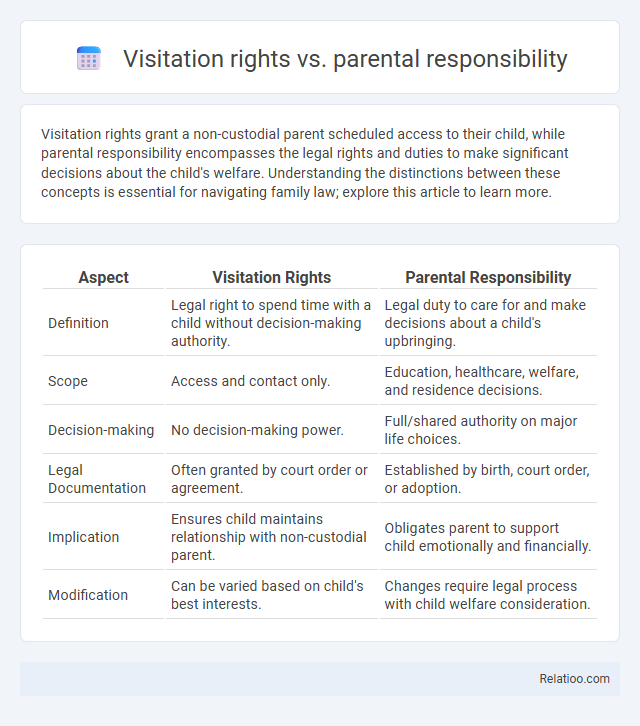Visitation rights grant a non-custodial parent scheduled access to their child, while parental responsibility encompasses the legal rights and duties to make significant decisions about the child's welfare. Understanding the distinctions between these concepts is essential for navigating family law; explore this article to learn more.
Table of Comparison
| Aspect | Visitation Rights | Parental Responsibility |
|---|---|---|
| Definition | Legal right to spend time with a child without decision-making authority. | Legal duty to care for and make decisions about a child's upbringing. |
| Scope | Access and contact only. | Education, healthcare, welfare, and residence decisions. |
| Decision-making | No decision-making power. | Full/shared authority on major life choices. |
| Legal Documentation | Often granted by court order or agreement. | Established by birth, court order, or adoption. |
| Implication | Ensures child maintains relationship with non-custodial parent. | Obligates parent to support child emotionally and financially. |
| Modification | Can be varied based on child's best interests. | Changes require legal process with child welfare consideration. |
Understanding Visitation Rights: A Legal Overview
Visitation rights grant non-custodial parents the legal ability to spend time with their children, ensuring ongoing relationships despite not having primary custody. Parental responsibility encompasses the broader legal duties and rights related to a child's care and decision-making, which may be shared or sole. Understanding your visitation rights is crucial to navigating custody arrangements and maintaining meaningful connections with your child within the framework of family law.
Defining Parental Responsibility in Family Law
Parental responsibility in family law refers to the legal rights, duties, powers, and authority a parent has concerning their child's upbringing, including decisions about education, health, and welfare. Unlike visitation rights, which generally grant a non-custodial parent the scheduled opportunity to spend time with their child, parental responsibility encompasses broader decision-making authority regardless of custody arrangements. Non-custodial parents may or may not hold parental responsibility, but when they do, they share legal responsibilities that influence the child's daily life and long-term wellbeing.
Key Differences Between Visitation Rights and Parental Responsibility
Visitation rights refer to the legal permission for a non-custodial parent to spend time with their child, while parental responsibility encompasses the broader legal duty to make major decisions about the child's welfare, including education, health, and religion. You have visitation rights if you do not have parental responsibility, allowing meaningful contact without decision-making authority. The key difference lies in control: visitation is about time and access, whereas parental responsibility involves legal rights and obligations affecting the child's overall upbringing.
Legal Framework Governing Visitation and Parental Duties
Visitation rights, parental responsibility, and non-custodial status are distinct legal concepts that define the roles and privileges of parents in family law. The legal framework governing visitation rights ensures non-custodial parents maintain meaningful contact with their children, while parental responsibility encompasses the duties and decision-making authority over the child's welfare shared by one or both parents. Your understanding of these terms is crucial for navigating custody arrangements, as visitation rights do not equate to parental responsibility, which legally binds you to the child's upbringing and key decisions.
Factors Influencing Court Decisions on Visitation and Responsibility
Courts evaluate factors such as the child's best interests, parental fitness, and the emotional bond between the child and each parent when determining visitation rights and parental responsibility. Your involvement in the child's daily life, ability to provide a stable environment, and history of cooperation with the other parent heavily influence court decisions. Non-custodial parents are granted visitation based on demonstrating consistent care and support, ensuring the child's welfare remains the primary concern.
Enforcement and Modification of Visitation Orders
Enforcement of visitation rights ensures non-custodial parents maintain regular contact with their children, often requiring court intervention if visits are denied or obstructed. Parental responsibility includes rights and duties beyond visitation, such as decision-making authority, which can affect enforcement when disputes arise over modifications. Modification of visitation orders typically demands significant changes in circumstances, with courts prioritizing the child's best interests while balancing custodial and non-custodial parental roles.
Parental Responsibility: Rights, Duties, and Limitations
Parental responsibility encompasses the legal rights, duties, and responsibilities a parent has toward their child's welfare, education, and health decisions, regardless of whether they have custody. It grants parents authority to make significant decisions affecting the child's upbringing but does not inherently provide visitation rights, which are separate and pertain to time spent with the child. Your parental responsibility obliges you to support and protect your child while recognizing that access and custody arrangements may limit how and when you exercise those rights.
Impact of Visitation and Responsibility on Child Welfare
Visitation rights grant non-custodial parents access to spend time with their child, essential for maintaining emotional bonds and promoting psychological stability. Parental responsibility encompasses decision-making authority over a child's education, health, and welfare, directly influencing the child's overall well-being and development. Understanding how your visitation schedule and parental responsibilities affect your child's welfare helps foster a supportive environment that nurtures growth and security.
Common Disputes: Resolving Visitation vs. Responsibility Conflicts
Common disputes in visitation rights often stem from conflicts between parental responsibility and non-custodial arrangements, where one parent seeks to enforce visitation while the other controls major decisions affecting the child. Your ability to navigate these challenges relies on clearly understanding legal distinctions: visitation grants time with the child, parental responsibility encompasses decision-making authority, and non-custodial status refers to the parent without primary custody. Effective resolution requires mediation or legal intervention to balance visitation schedules with shared or sole parental responsibilities, reducing friction and prioritizing the child's best interests.
Practical Tips for Parents Navigating Visitation and Responsibility Issues
Understanding visitation rights, parental responsibility, and non-custodial status is crucial for parents managing custody arrangements. You should establish clear communication channels, document all agreements, and seek mediation to resolve disputes efficiently. Prioritize the child's well-being by adhering to court orders and maintaining consistent involvement in their life despite non-custodial status.

Infographic: Visitation rights vs Parental responsibility
 relatioo.com
relatioo.com